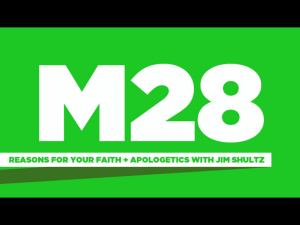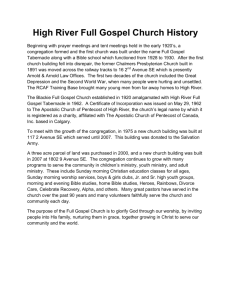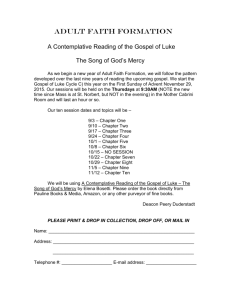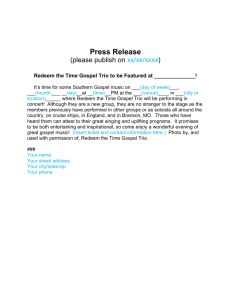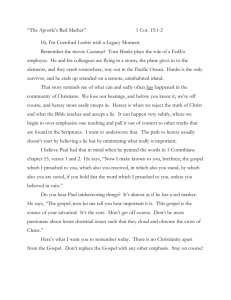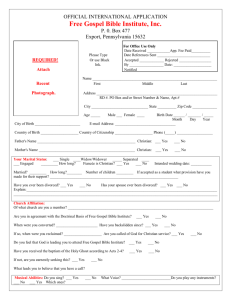A. Apologetics Interview and Gospel presentation
advertisement
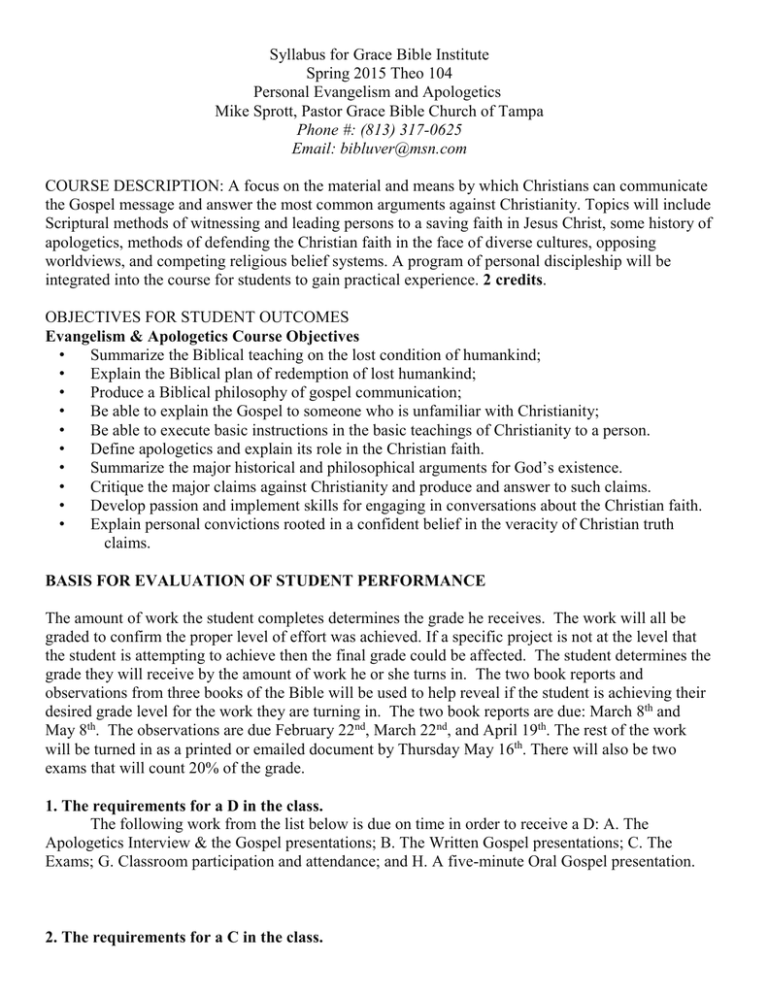
Syllabus for Grace Bible Institute Spring 2015 Theo 104 Personal Evangelism and Apologetics Mike Sprott, Pastor Grace Bible Church of Tampa Phone #: (813) 317-0625 Email: bibluver@msn.com COURSE DESCRIPTION: A focus on the material and means by which Christians can communicate the Gospel message and answer the most common arguments against Christianity. Topics will include Scriptural methods of witnessing and leading persons to a saving faith in Jesus Christ, some history of apologetics, methods of defending the Christian faith in the face of diverse cultures, opposing worldviews, and competing religious belief systems. A program of personal discipleship will be integrated into the course for students to gain practical experience. 2 credits. OBJECTIVES FOR STUDENT OUTCOMES Evangelism & Apologetics Course Objectives • Summarize the Biblical teaching on the lost condition of humankind; • Explain the Biblical plan of redemption of lost humankind; • Produce a Biblical philosophy of gospel communication; • Be able to explain the Gospel to someone who is unfamiliar with Christianity; • Be able to execute basic instructions in the basic teachings of Christianity to a person. • Define apologetics and explain its role in the Christian faith. • Summarize the major historical and philosophical arguments for God’s existence. • Critique the major claims against Christianity and produce and answer to such claims. • Develop passion and implement skills for engaging in conversations about the Christian faith. • Explain personal convictions rooted in a confident belief in the veracity of Christian truth claims. BASIS FOR EVALUATION OF STUDENT PERFORMANCE The amount of work the student completes determines the grade he receives. The work will all be graded to confirm the proper level of effort was achieved. If a specific project is not at the level that the student is attempting to achieve then the final grade could be affected. The student determines the grade they will receive by the amount of work he or she turns in. The two book reports and observations from three books of the Bible will be used to help reveal if the student is achieving their desired grade level for the work they are turning in. The two book reports are due: March 8th and May 8th. The observations are due February 22nd, March 22nd, and April 19th. The rest of the work will be turned in as a printed or emailed document by Thursday May 16th. There will also be two exams that will count 20% of the grade. 1. The requirements for a D in the class. The following work from the list below is due on time in order to receive a D: A. The Apologetics Interview & the Gospel presentations; B. The Written Gospel presentations; C. The Exams; G. Classroom participation and attendance; and H. A five-minute Oral Gospel presentation. 2. The requirements for a C in the class. The following work from the list below is due on time in order to receive a C: A. The Apologetics Interview & the Gospel presentations; B. The Written Gospel presentations; C. The Exams; D. A Book Review; F. Observations on Romans only; G. Classroom participation and attendance; and H. A five-minute Oral Gospel presentation. 3. The requirements for a B in the class. The following work from the list below is due on time in order to receive a B: A. The Apologetics Interview & the Gospel presentations; B. The Written Gospel presentations; C. The Exams; E. A Book Review; F. Observations on Romans and John; G. Classroom participation and attendance; and H. A five-minute Oral Gospel presentation. 4. The requirements for an A in the class. The following work from the list below is due on time in order to receive a B: A. The Apologetics Interview & the Gospel presentations; B. The Written Gospel presentations; C. The Exams; D. A Book Review; E. A Book Review; F. Observations on Romans, John and Acts; and H. Classroom participation and attendance; and I. A five-minute Oral Gospel presentation. The Assignment list: A. Apologetics Interview and Gospel presentation: Interview and Written Report: 1) Interview one non-Christian. This person can be an acquaintance, a friend, or a family member. It can even be a stranger. Ask the person the following questions (with accompanying explanations of answers): a) Should religion play an important role in private or public life? If so, how important and why? What role has religion played in your own life? b) Do you think there is one true religion? If so, what is it? If not, can religions that make contradictory claims be true? (E.g., can Christianity, which claims that Jesus is God and that Jesus died on the cross, be true at the same time as Islam, which claims that Jesus is not God and that Jesus did not die on the cross?) c) Do you think some religions are false? If so, give an example and why you think it’s false. d) Is there one major religious issue that you find very difficult to deal with or answer (such as why there is evil in the world if God exists or what is the purpose of human life)? Do you want to find answers to it? e) Can you summarize in a sentence or two what Christians believe? Do you think you could ever be convinced that Christianity is true? If so, what would it take? If not, why? f) What do you think of the Christian church today? Is it a good argument for the truth of Christianity or not? 2) Write up a report and analysis of your conversation in an essay that is approximately 2000 words (double-spaced). In your analysis, reflect on your conversation in light of the readings in Christian Apologetics. What arguments could you have (or did) employ in the conversation. Why would you use these? What was the worldview perspective of the interviewee (Monotheist, Pantheist, Atheist, etc.)? What inconsistencies did the interview reveal about their worldview? How would you address these inconsistencies? Think strategy here and walk through it. 3) Ask them if they mind if you could share with them what biblical Christianity is? Make sure you cover the five points of the Gospel Presentation. 4) The report is due by 4/30, midnight. Late reports are accepted at a penalty of 10% per day. B. Written Gospel Presentations: Each student will turn in a preliminary gospel presentation on the second Thursday of the semester. The student will also be required to memorize a summary outline for presenting the Gospel to an unbeliever. The student then will write out another Gospel presentation based on the outline on March 5th in class. C. The Exam: There will be two exams. There will be a study sheet provided before each of the exams. The exams will be open notes and open Bible exams. D. A Book Report: Each student is to write a summary paper of 3-4 pages in length, summarizing the content of Evangelism and the Sovereignty of God by J.I. Packer. The paper must include the student’s personal evaluation of the book. Reflect upon the impact of the book on your personal evangelism. The goal of this assignment is not to be a historical retelling of the content of the book, though there should be enough to assure that you have read the book. It should include your personal interactions with the contents. E. A Book Report: Each student is to write a summary paper of 3-4 pages in length, summarizing the content of Biblical Apologetics by Clifford McManis. The paper must include the student’s personal evaluation of the book. Reflect upon the impact of the book on your personal evangelism. The goal of this assignment is not to be a historical retelling of the content of the book, though there should be enough to assure that you have read the book. It should include your personal interactions with the contents. Ebook is only $3.99 http://bookstore.xlibris.com/Products/SKU-0134054003/BiblicalApologetics.aspx F. Bible Observations: On the days when Bible reading is assigned the student must write down observations from the text in a notebook or in a Word document to be turned in. An observation must be a complete sentence on something observed about the Gospel from the text. The complete sentence can be in the form of a question concerning a thought or concept that the student would like to understand more. The complete sentence can also include repeated themes from the context. There must be ONE sentence for every chapter of the Bible the student reads. We will be making our observations from the following books of the Bible: Romans, John and Acts. Observations should be Gospel centered. That is, they observe something about God, humanities’ need, God’s provision of the Lord Jesus, God’s required response to the Gospel or what takes place at salvation. G. Class Participation & Attendance: Students should be prepared for class and interacting with the material and other students. Part of the classroom participation is identifying five people you will pray for the throughout the semester who are in need of the Lord. The student must bring their Bibles to class and be ready to read every class. Any student that misses more than three unexcused classes will see a grade reduction. H. Oral Gospel Presentation: Each man will give a 5-7 minute Gospel presentation. The presentations will be made at the start of class or one of the services for GBCT. The presentation will be without notes. ‘The evangelist’ can use a Bible. The Gospel must include the five main points of a Gospel presentation. OUTLINE OF WEEKLY SCHEDULE OF CONTENT Week Date 1 Jan 24 2 31 Romans 1-5 Feb 7 Romans 5-10 14 Romans 11-16 21 No Class but work on Observations 28 John 1-5 3 4 Mar 7 5 Topic Introduction & Definitions 7 Initial written Gospel presentation Romans Observations are due Sunday 22nd John 6-10 No Class but work on Book JI Packer Book review is due Sunday report the 8th 14 John 11-15 21 John 16-21 No Class but work on Observations 6 Assignment 28 Acts 1-7 April 4 Acts 8-15 11 Acts 16-22 18 Acts 23-28 No Class but work on John Observations are due Sunday 22nd Acts observations are due 19th observations 8 9 10 25 McManis chapter 1-3 May 2 McManis chapter 4-7 7 McManis chapter 8-11 12 Finish Interview 17 No Class just work on Final Final Exam due 18th 24 No Class just work on Final Work Final work is due 25th Absences/Late Work McManis Book review is due Sunday the 8th • • • The rules regarding absences and tardiness (see the handbook) will be enforced. Work received late will be marked down one-half letter grade for every day late. Tests may NOT be taken late unless for serious sicknesses or emergencies as defined by the student services. Absences during gray days will count as double absences and will cause the student to forfeit homework or assignments due on those days Late Work cannot and will not be accepted past Final exam day. All late work will get the 5% per day deduction. INSTRUCTIONAL MATERIAL AND RESOURCES Evangelism • A copy of the HOLY BIBLE – to be brought to class daily. • Evangelism and the Sovereignty of God by J.I. Packer, InterVarsity Press, 1961. • Biblical Apologetics: Advancing and Defending the Gospel of Christ By Clifford B. McManis. METHODS OF INSTRUCTION 1. Lecture 2. Discussion 3. Video 4. In class group projects CHRISTIAN EDUCATION PHILOSOPHY ELEMENTS ADDRESSED This course seeks to affirm that the Word of God is inspired and is the rule of faith and practice. It also seeks to affirm that God is the Author of creation and the Source of all truth and that God through Jesus Christ reveals truth. ATTENDANCE POLICY Please note the attendance policy as found in the Guide. You are responsible to follow all the attendance policies stated therein. You are allowed 3 absences from class for personal or illness reasons. After three, you will be dropped from the class. All work must be completed prior to a scheduled absence. If you are sick, you should contact me by institute email (bibluver@msn.com) prior to class. PLAGIARISM AND CHEATING POLICY Plagiarism is not tolerated at GBI. Use proper citations for reworded material and quotation marks for exact words. If you quote yourself from another paper, cite it. Plagiarism is stealing and lying and carries heavy disciplinary and academic penalties and could result in suspension from the Institute. The following three statements will help clarify. Plagrism • If you cite your own previous writing, submit that work with your current assignment. • Properly cite all research. Use proper documentation for direct quotations, as well as information restated (paraphrased) in your own words. Only general knowledge should not be cited. • The student who affixes his or her name to the paper must be the sole author of the paper. Students may consult with the teacher at any point in composing a paper. A typist or significant other may not ghostwrite, proofread, or correct the paper. Attribution Errors • • • Papers that have more than two sentence-length attribution errors receive a zero. This severe penalty reflects the moral disgrace of the offense. Attribution errors comprise these wrong practices: Plagiarism: the presenting as one’s own the words or ideas from a source Misrepresentation: inaccurately presenting the words or ideas from a source The following are typical attribution errors: • Failure to use quotation marks for exact words (with or without citation) • Failure to cite the words or ideas of a source • Failure to paraphrase correctly (mixing source and student words without quotation marks around the source’s words) • Failure to give the correct location of a source (wrong source or wrong page number) Cheating • Cheating is copying another’s work and claiming it as your own original work, whether it is on a homework assignment, quiz, test, exam, or project. Group work is designated as such by the faculty. • Cheating is not tolerated at GBI; students who cheat will receive a “0” on the assignment and could be suspended from the Institute.

